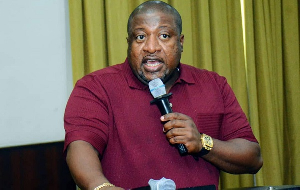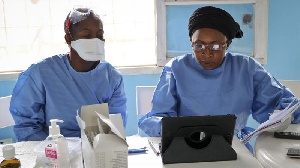By Dr. Michael J.K. Bokor
E-mail: mjbokor@yahoo.com
Friday, October 7, 2011
The strike action by doctors and housemen at the country’s health institutions (hospitals, polyclinics, and clinics) is many days old now without any sign of being called off. If anything at all, indications are clear that it will persist till who-knows-when?
So far, what we’ve had is a useless shouting match between the Ghana Medical Association (especially its President, Dr. Emmanuel Adom Winful) and a beleaguered government side (led by its appointees at the Ministry of Health). While this shouting match goes on, human life is at risk and the country’s public health care delivery system stagnates while the government’s own image suffers.
The striking doctors have rejected several appeals to their conscience to return to work and have instead chosen to intensify their action by not attending to emergency cases as well. Certainly, the situation is not only chaotic but it is also deplorable.
Two things are obvious: the GMA’s intransigence, which portrays the striking doctors and housemen as greedy and insensitive but determined to exact their pound of flesh; and the government’s seemingly lackadaisical attitude to the strike action and the factors that engendered it, which reinforces public concerns about the shoddy manner in which our politicians tackle national problems.
Strike actions of this sort by the country’s professionals are nothing new to Ghanaians. Indeed, they are perennial and don’t raise eyebrows. But should we remain unperturbed or indifferent?
Some people have accused the GMA of politicizing their stance and turning its members’ grievances into a political tool with which to fight and undermine the government. Despite the GMA’s prompt denial, it can’t be ruled out that the strike action has some political dose in it apart from the mere grievances against the Single Spine Salary Structure (SSSS) that triggered it. Politics is everywhere in our affairs.
Utterances laced with insinuations of incompetence against President Mills (that the opposition NPP has latched on to for its partisan political purposes), political biases, and threats betray the GMA’s stance. To all intents and purposes, the matter has already assumed a political dimension and given the GMA’s strike action a political twist that can’t escape any careful observer of events. This political dimension has always been an integral part of all industrial actions against the government of the day.
And many governments have suffered from the negative impact. I remember very well how the country’s professionals banding themselves together under the umbrella of the Association of Recognized Professional Bodies (ARPB) used industrial actions to torment the Acheampong government until it lost credibility and suffered from the negative backlash in the 1970s.
Those accusing the doctors of greed and insensitivity are using the so-called Hippocratic Oath as a point of reference to suggest that the doctors have placed material gains above their vow of selfless devotion to save lives in accordance with the tenets of their profession. Such people are nothing but ignorant, especially in a political system in which self-acquisition and material wealth determine who is who in the society.
Doctors too know how to make money and are in their profession to do so, just as the politicians do. It is no exaggeration to say that money-making is the order of the day, especially as we can see happening in the lives of those who enter politics and become wealthy overnight. Just as our politicians value wealth, so do all others. No one should intimidate anybody with any reference to a Hippocratic Oath. The solution lies elsewhere—the government must act expeditiously to end the strike action!
How many times haven’t doctors complained about lack of equipment to work with? Or about their poor conditions of service such that they don’t even have vehicles to expedite their work? And how easy isn’t it for a politician to get car loans or to have access to the corridors of power for selfish gains? To worsen matters, the government doesn’t even seem to have an open-door approach to handling matters for it to relate to public sector workers as partners in national development. The politicians always have the edge.
Because politics has become a gold mine, do we not have some of our doctors abandoning their career to do it and to reap the fruit overnight? What is it about our politicians’ crave for wealth that should be condemned in others like our doctors and teachers who continue to work under trying circumstances and live modest lives while the do-nothing politicians wallow in opulence? There is something basically wrong with our value system in this 4th Republic.
One might be tempted to think that with the establishment of the 4th Republic and the encouraging signs that our constitutional democracy is stable, approaches toward registering and redressing grievances will be better than what had obtained in the heady days of unstable and wayward military regimes or their ineffective civilian counterparts that led us nowhere out of the woods.
I don’t think that this kind of atmosphere will redound to our democracy’s wellbeing. It suggests that we are still not doing what we should to grow it. A democracy that is positioned to grow will be furnished with structures and mechanisms to address potential problems to prevent them from exploding into what will destabilize it.
Such a democracy will depend on strong institutions as well as shock absorbers in the form of dialogue and good conscience, which should eliminate distrust and negative tendencies of the sort that has led to this industrial action by the GMA.
In our case, however, the opposite is the norm. Our governments have failed to strengthen the institutions of state for them to absorb the shock that arises from segments of the public sector embittered at unfavourable conditions of service. Had we had strong institutions, they would have addressed problems at their formative stage to move us forward in a better organized manner.
The Mills-led government hasn’t been up-and-doing, which has created distrust between it and almost all the segments of the labor force that have either threatened to go on strike or have actualized that threat. I have insisted all along that the government’s intransigence and recourse to hardline measures to resolve industrial concerns are anachronistic.
In this instance too, it seems to know no other solution but the use of such anachronistic means as threatening workers with “bonding” to prevent doctors from laying down their tools in future (coming from Haruna Iddrissu, Acting Minister of Health); and arm-twisting ones such as asking doctors to either accept the government’s offer or resign to engage in private practice. This stance will definitely lead to the collapse of the public health delivery system. Then, other negative happenings will emerge to worsen the plight of the people. Is that how a government elected by the people to solve their existential problems should behave?
Then, comes the most worrisome aspect. How on earth can a Minister of Health go on leave when his house is burning? Yet, that was what President Mills chose to allow Joseph Yieleh Chireh to do. We have heard reports that contrary to claims that he was on sick leave, he was strong and going about campaigning in the Wa constituency that he represents in Parliament. This person is not fit to head any Ministry and must be given the boot. But can President Mills do so?
Yet another problem. We know that the Fair Wages and Salaries Commission has been tasked to negotiate with the striking doctors to resolve the crisis; but reports emanating from the proceedings so far indicate that the bad-blood relationship between it and the GMA team has already marred negotiations. This institution lacks the capacity to handle problems that are pushed on to it. It is weak and cannot be depended on to solve the problem.
Probably, it will not be out of place to suggest that the government should begin serious efforts to divest itself of management of the public health institutions. In other words, all these institutions must be privatized and handled by those who have the expertise and financial capacity to do so. In other countries, that is what happens. If the government wants to avoid tying its political fate to the sentiments of doctors and the electorate, generally, then, it must not continue to remain in that loop of determining the service conditions of doctors, etc. Private entrepreneurs should be encouraged to take over these public health institutions with the Ministry of Health exercising only supervisory authority.
Furthermore, the government must stop doing cheap politics with measures such as the Single Spine Salary Structure (SSSS). We all saw how the government took credit for migrating some segments of the public sector workers (the Police and Fire Service, particularly) to the SSSS and praised itself for improving the emolument situation. The indecent haste with which this SSSS was implemented for some segments suggested that the government wanted to earn political capital.
But as Fate would have it, not all public-sector workers can be migrated to the SSSS, which is what we are beginning to see. The government has started complaining that it doesn’t have the adequate financial resources to do so, which means that the SSSS is either being lopsidedly implemented or that there is something basically wrong with the government’s approach to tackling problems.
In this circumstance, whatever credit the government might have gained from the initial implementation of the SSSS risks being wiped out. Then, its credibility will take a nosedive and public goodwill for it will be eroded as is currently happening in the case of the GMA. This kind of flim-flammery won’t win votes. As the 2012 elections loom large, will the government act expeditiously to redeem itself? Or will it continue to step on every toe in sight and turn round to blame its political opponents for its woes? Only time will tell.
Opinions of Sunday, 23 October 2011
Columnist: Bokor, Michael J. K.














